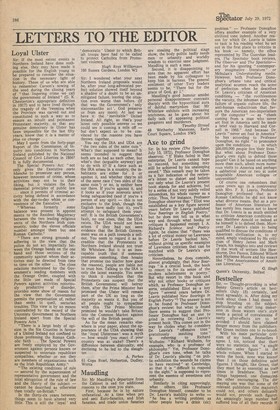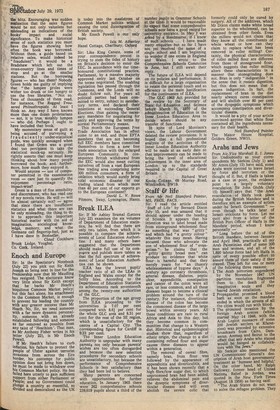Bestseller
Sir, — Thought-provoking is what Benny Green's article on bestsellers (July 15) certainly, and most agreeably, is. After doing my book about them I had meant to stop. brooding on the subject, Particularly as after long immersion in those waters one's style needs a period of convalescene if nasty after-effects are to be avoided: I should have claimed danger money from the publishers. But Green inclines one to re-brood. With his main particular criticism of my book, Bestsellers I agree. I, too, noticed that there were no statistics, not "a single definitive sales figure " in the whole volume. When I started to write the book, none was keener than I on those definitive saleS figures. I thought, like Green, that they must be as essential as trair times in Bradshaw. Then two things happened, one dismaying, the other encouraging. The dismaying one was that some of the relevant publishers (the majority), could not, and others delicatelY would not, provide such figures. An amazingly large number had suffered loss of all their records in
the blitz. Encouraging was sudden realisation that the sales figures Would be not only valueless but misleading as indications of the books' impact and social significance. To make historical sense of such statistics you must have the figures showing how often the book was borrowed. Without them, a guide based on relative sales, would indeed be " fraudulent": it would be a Bradshaw which left out the cross-country lines and times of stop and go at the smaller stations. But the borrowing figures — who has them? Nobody. Green holds me guilty of implying that "the lumpen proles were wither too drunk or too hungry to use the free libraries. "Not so. Tens of thousands of them read, for instance, The Ragged Trousered Phlinathropists. At least I think so. Any way I have known more than one dozen proletarians — not, it is true, notably lumpen — who did. Perhaps I ought to have included that book.
My momentary sense of guilt at being accused of purveying a f raudulently under-statistical guide, was quickly assuaged when I found that Green was a great deal too percipient to take the statistical mock-up seriously. He rightly asserts that one must keep thinking about how many people borrowed the book, and. furthermore, how much they enjoyed it.
Would anyone — use of computer permitted in the examination room — care just to quantify the enjoyment percentage ratio, impact-wise?
Green is a man of fine sensibility and discernment, who has read one of my novels twice. He will — will he almost certainly not? — agree that since there are insufficient statistics and what there are can be only misleading, the thing to do is to approach this important historical matter with the aid of imagination, sociological knowledge, memory, and what the Germans call fingertip-feel, just as I have done in Bestseller.
Claud Cockburn Brook Lodge, Youghal, Co. Cork, Ireland.









































 Previous page
Previous page